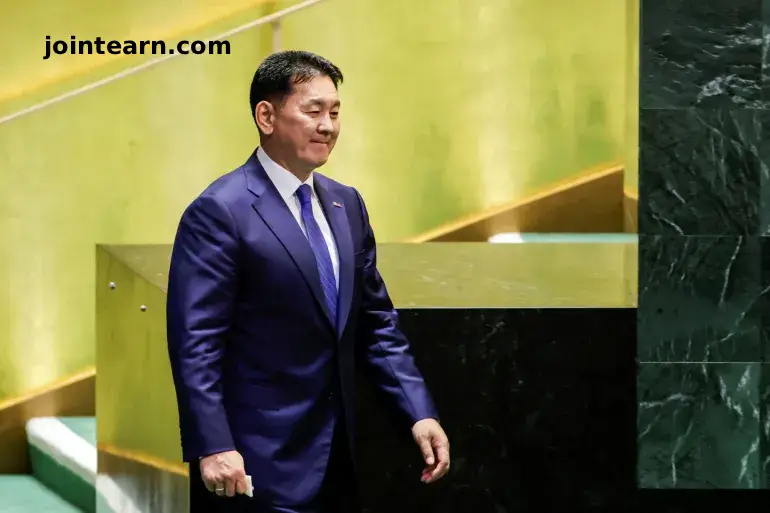
In a dramatic escalation of Mongolia’s deepening political turmoil, President Ukhnaa Khurelsukh has vetoed a resolution by parliament to remove Prime Minister Gombojav Zandanshatar, citing “procedural flaws” that he said violated the country’s constitution and undermined the rule of law.
The decision, announced Monday through the state-run Montsame News Agency, comes just three days after lawmakers in the State Great Khural — Mongolia’s parliament — voted to oust Zandanshatar amid growing internal conflict within the ruling Mongolian People’s Party (MPP).
A Political Showdown Inside the Ruling Party
President Khurelsukh, himself a senior member and former leader of the MPP, said the vote to remove the prime minister was invalid because the parliamentary session lacked a legal quorum when it began.
“These procedural flaws constitute a breach of the Constitution and compromise the principle of the rule of law,” the president’s office declared in an official statement.
The constitutional court in Ulaanbaatar is now expected to convene in the coming days to evaluate the legitimacy of the president’s veto — a move that could determine the survival of Zandanshatar’s administration and the stability of the MPP’s fragile majority.
The prime minister, who took office in June after his predecessor Luvsannamsrain Oyun-Erdene lost a no-confidence vote, has struggled to unify his party and navigate mounting public discontent over corruption and economic stagnation.
Internal Power Struggle and Leadership Rift
Zandanshatar’s downfall was triggered by his controversial overhaul of Mongolia’s minerals policy — a core issue in a nation where mining accounts for nearly a quarter of GDP. The prime minister pushed to link royalty payments for exporters to domestic stock prices rather than to international benchmarks, a change that critics warned could slash state revenues and discourage foreign investment.
His opponents within the MPP accused him of mishandling the reform process and alienating key industry stakeholders. Detractors also faulted him for appointing a justice minister without parliamentary consultation, an act lawmakers said breached legal procedure.
The conflict intensified after Zandanshatar lost the party’s internal leadership election last month to parliamentary speaker Amarbayasgalan Dashzegve — who himself resigned last week amid corruption allegations. The double resignation threat has deepened divisions in Mongolia’s political elite, exposing long-standing rivalries between factions loyal to Khurelsukh and those aligned with younger reformist leaders.
Economic Turmoil and Public Anger
Mongolia, a mineral-rich nation nestled between China and Russia, has been mired in economic uncertainty throughout 2025. Despite vast coal, copper, and rare-earth reserves, the country has struggled with high inflation, low foreign investment, and persistent corruption scandals.
Public frustration erupted in the summer when mass protests in Ulaanbaatar called for greater transparency in mining revenues and stronger measures against graft. The ouster of Oyun-Erdene in June and the attempted dismissal of Zandanshatar now mark the second major government shakeup within five months — underscoring the depth of Mongolia’s political instability.
Khurelsukh’s Strategic Calculus
President Khurelsukh, a former army officer and ex-prime minister himself, appears determined to restore order within the MPP and prevent a constitutional crisis. Analysts say his veto may be both a legal and political maneuver designed to consolidate power and preserve party unity ahead of next year’s parliamentary elections.
“Khurelsukh is walking a tightrope,” said Bat-Erdene Myagmarsuren, a political science professor at the National University of Mongolia. “By blocking the ouster, he projects authority and control — but risks alienating reformist factions who see him as protecting the status quo.”
Khurelsukh recently returned from a state visit to India, where Mongolia and India signed new agreements on oil and gas cooperation, part of Ulaanbaatar’s broader effort to reduce energy dependence on China. The timing of his veto, coming immediately after that trip, highlights the intersection of domestic instability and Mongolia’s increasingly complex geopolitical balancing act.
What Comes Next
The Constitutional Court of Mongolia will now review whether the parliamentary session that voted to remove Zandanshatar was legitimate. If the court upholds Khurelsukh’s veto, Zandanshatar could remain in office — though his weakened mandate may limit his ability to govern effectively.
If the court overturns the veto, Mongolia could face yet another transition of power, further rattling investor confidence in a nation heavily reliant on foreign partnerships in mining, infrastructure, and energy.
Political observers warn that continued instability could slow Mongolia’s economic recovery and weaken public trust in democratic institutions.
A History of Political Volatility
Mongolia’s semi-presidential system, introduced after the 1990 democratic revolution, has seen frequent clashes between presidents and prime ministers — often stemming from overlapping powers and competing party loyalties. Over the past decade, no Mongolian prime minister has served a full term without facing a major no-confidence challenge or corruption scandal.
As the MPP attempts to navigate this latest crisis, analysts say the episode could redefine the balance of power between the presidency and parliament — and test whether Mongolia’s young democracy can withstand yet another wave of political upheaval.


Leave a Reply